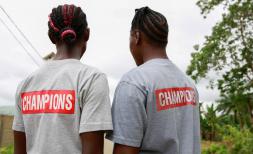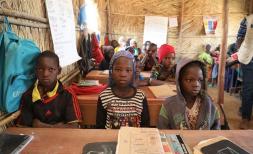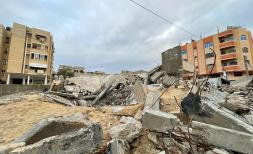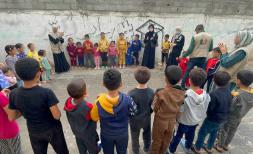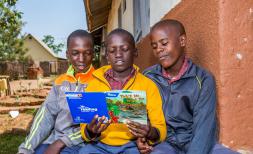CHILDREN WITH DISABILITIES HAVE A RIGHT TO QUALITY EDUCATION
Aziz* is a Rohingya refugee living in Cox's Bazar. His leg was amputated after he was shot in Myanmar.
Almost a year since we first heard of novel coronavirus, the world is still not what it used to be. 325 million learners remain affected by school closures around the world[i].
For children with disabilities, who – even before the pandemic – were less likely to be in school or receive quality education, school closures can be particularly challenging.
Lack of trained teachers, accessible materials and lessons and support at home are all barriers to learning for children with disabilities having to learn at home without adequate support.
In Save the Children’s most recent study, The Hidden Impact of COVID-19 on Children and Families with Disabilities[ii], we found that children with disabilities were less likely (78%) to be in school than children without disabilities (90%), even before the outbreak of COVID-19.
Children with disabilities are also at greater risk of permanent drop out as their parents have lower expectations of them returning to school (87%) compared with parents of children without disabilities (94%).
When asked, “What worries you the most about the COVID-19 outbreak?” one16-year-old boy with a disability, from Afghanistan, replied: “Schools being closed and not sure about my future.”
Amongst child respondents with disabilities, 7 in 10 told us they needed home schooling or learning materials and 6 in 10 reported that they had nobody who could help them with their learning. Four out of 10 parents of children with disabilities also felt that they were unable to support their child’s learning at home.
“Be more patient with us,” said one 12-year-old girl with a disability, in Burkina Faso, when asked, “What can adults in your home do differently during the outbreak of COVID-19?”
“I’d ask for more opportunities for persons with disabilities. Our life is always in quarantine. We stay in isolation and hopeless about the future,” said a 17-year-old girl with disability, in Kosovo, when asked “If you were asked to write a letter to leaders in your country, what would you say?”
Bradley, 10, Zimbabwe, received hygiene kits from Save the Children
Supporting children with disabilities during times of coronavirus and beyond
Save the Children is supporting families with children with disabilities, training educators on inclusive education, enrolling children with disabilities in schools, supporting individual learners with disabilities and facilitating referrals for assistive devices and aids across our programmes.
We know that we can contribute to more children with disabilities receiving a quality education by both mainstreaming disability into our programmes and offering targeted interventions to them and their families where needed.
JOYCE*, 7, UGANDA
Joyce*, 7, in Uganda has a hearing loss. She dropped out of school for a full term because her teachers failed to meet her needs of facing her so she could lip-read to understand them. Instead, they punished her and her peers mocked and ignored her.
As life at school became more difficult, Joyce* lost all interest for school and simply stopped going. Although all of her siblings went to school, both Joyce* and her parents had given up on her education.
Through our interventions, she was fitted with a hearing aid and her family received support to accept and believe in her. In her school, we trained all teachers and staff on inclusive education so that they are now ready to receive Joyce* when she returns next year.
In the meantime, we have set up a school inclusion team who visits Joyce* weekly to support her home learning. Joyce* has regained her will to learn and study and has new hope in her life and a supportive family.
SOPHIA*, 7, AND EMILY*, 9, RWANDA
In Rwanda, Save the Children’s partnership with UWEZO[iii] engages 137 youth volunteers with disabilities in our project ‘Mureke Dusome’ who together have empowered the parents of more than 2,200 children with disabilities to support their children’s reading.
Sophia*, 7, who has a psychosocial disability, is one of many children with disabilities who have developed a reading habit during the COVID-19 pandemic as a direct result of receiving more support from her parents. They attended Save the Children's inclusion workshops and received home visits by the youth volunteers.
“I set a goal with my mother to read a book per month. Now, I read every day,” she says.
Her father adds, “The workshops and home visits helped me to identify my child’s strength. Before, I thought I did not have time for my child with a disability. After receiving home visits from the Youth Volunteer with Disability, I now always encourage my child to read and follow the radio lessons.”
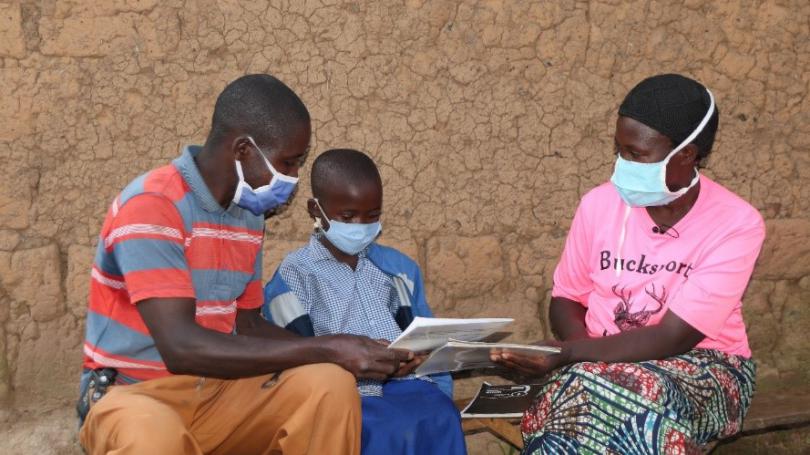
Sophia* and her parents read a selection of storybooks together
The project also helps combat some of the common discrimination, harmful practices and attitudes towards children with disabilities in the community. Natasha*, a female volunteer who also has a disability, told us:
“Before, some parents believed that children with disabilities are worthless; I would visit a family with four children, and the parents would say they have only three children to hide or neglect their child with a disability. After attending the workshops and home visits, this attitude changed.”
Emily*, 9, also in Rwanda, did not start school when she was of age because of her intellectual impairment and her parents’ negative attitudes about her disability and potentials. It was not until youth mentors with disabilities from another of our projects in Rwanda worked with local leaders to convince the family to send her to school that things changed.
Emily*, who used to be an unhappy girl who felt very isolated, is now comfortable and happy because she is in school studying with her peers. Her mother says, “When Emily first began school she needed someone to help her but now is able to go herself and even run errands for me”.
GENTRIT, 16, KOSOVO
Gentrit is one of many children who has been learning from home even before the pandemic. This is because he uses a wheelchair to move around and the roads to his school and the school itself are not accessible.
“My teacher sends me homework and education material and then I work on it and send it back.”
Save the Children has supported Gentrit with a tablet for learning as well as an educational kit that includes didactic materials, educational toys and awareness messages. His family also received hygiene kits.[iv]
By having access to appropriate learning materials, Gentrit can now learn and make plans for his future. “I want to be a school director because I want to help create a better world for other children like me,”he says.
Since the pandemic started, Save the Children in Kosovo has supported 69 families with disabilities to access the internet. We have given 250 children with disabilities tablets for learning and 308 children have received educational kits to support distance inclusive education during the pandemic. Another 200 have received hygiene kits.
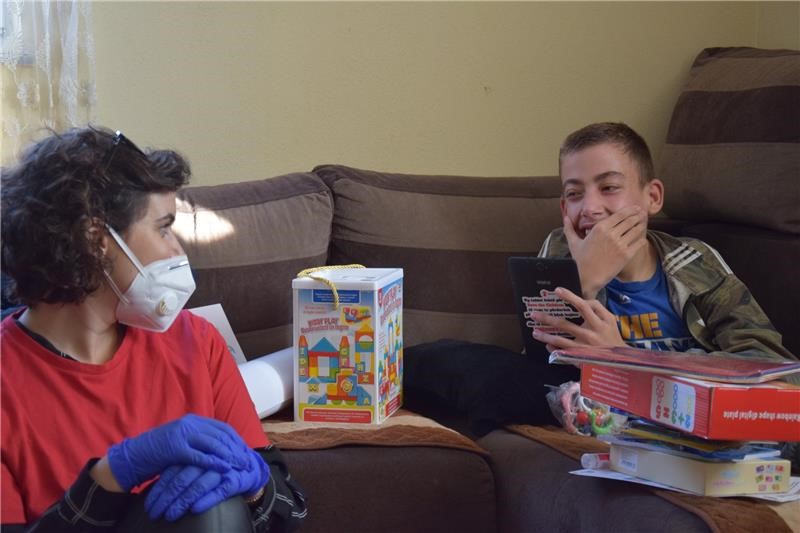
Gentrit laughs with a Save the Children staff member delivering his educational kit
We have an opportunity to build back better
If anything good can come out of this pandemic, it should be that we build back better and ensure that all children with disabilities can access and benefit from quality education so they can grow up with opportunities to choose their own paths and contribute to their communities.
Governments should ensure that all ‘Back to School’ initiatives are inclusive of children with disabilities and that indicators measuring re-enrollment, dropout rates and learning outcomes are disaggregated by disability by using comparative data collection tools[v].
We must continue to train teachers on inclusive education, special pedagogy and the use of accessible and diversified learning materials as well as provide parents with the necessary skills to support their children’s learning.
By working together and going the extra mile where we can, we can all contribute to supporting more children like Joyce*, Sophia*, Emily* and Gentrit to reach their full potentials.
*Names changed to protect identities
[i] UNESCO Dec 1st 2020 https://en.unesco.org/covid19/educationresponse
[ii] Orsander, M., Mendoza, P., Burgess, M., and Arlini, S.M. (2020), The hidden impact of COVID-19 on children and families with disabilities. London, Save the Children International. https://resourcecentre.savethechildren.net/node/18174/pdf/the_hidden_impact_of_covid-19_on_children_and_families_with_disabilities.pdf
[iii] UWEZO Youth Empowerment https://www.uwezoyouth.org/
[iv] Hygiene kits include washing powder, soaps, shampoo, sponges, toothbrush and toothpaste, sponges, disinfectants, washable and reusable face masks for adults and children as well as awareness messages. Educational kits included and came with instructions and awareness messages.
